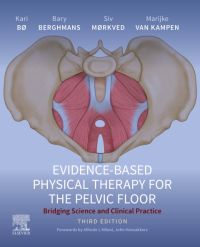Written by leading experts in this field, Evidence-Based Physical Therapy for the Pelvic Floor provides physiotherapists and other professionals with knowledge and confidence to bring the latest evidence-based approaches and treatment strategies for addressing pelvic floor dysfunction to their practice.
Fully updated and with a wealth of new information, this edition includes sections on devices and apps, gynaecological cancer, sexual dysfunction, fistula, clinical use of EMG, anal incontinence and pain, as well as a discussion of sexualized violence by Nobel Peace Prize winner Denis Mugwege and his team.
Key Features
- New and fully updated contents; new authors and new chapters provide contemporary evidence
- Innovative practice guidelines supported by a sound evidence base
- Colour illustrations of pelvic floor anatomy and related neuroanatomy/neurophysiology
- MRIs and ultrasounds showing normal and dysfunctional pelvic floor
- Key summaries for easy navigation
- Full colour throughout
Author Information
By Kari Bø, Professor, PT, PhD, Exercise scientist, Norwegian School of Sports Sciences, Oslo, Norway; Bary Berghmans, PhD, MSc, RPt, Epidemiologist and Researcher, Maastricht University Pelvic Care Centre, Maastricht, The Netherlands; Siv Mørkved, PT, MSc, PhD, Associate Professor and Senior Researcher, Department of Community Medicine & General Practice, Norwegian University of Science and Technology, Trondheim, Norway and Marijke Van Kampen, PhD, Professor in Rehabilitation Science, Katholieke Universiteit Leuven, Faculty of Kinesiology and Rehabilitation Science, University Hospital GHB, Leuven, Belgium
1 Overview of Physical Therapy for Pelvic Floor Dysfunction
2 Critical Appraisal of Randomized Trials and Systematic Reviews of the Effects of Physical Therapy Interventions for the Pelvic Floor
3 Functional Anatomy of the Female Pelvic Floor
4 Neuroanatomy and Neurophysiology of Pelvic Floor Muscles
5 Measurement of Pelvic Floor Muscle Function and Strength
5.1 Introduction
5.2 Visual Observation and Palpation
5.3 Manometry: Vaginal Squeeze Pressure Measurement
5.4 Pelvic Floor Dynamometry
5.5 Electromyography
5.6 Urethral Pressure Measurements
5.7 Ultrasound in the Assessment of Pelvic Floor Muscle, Anal Canal and Pelvic Organ Descent
5.8 Magnetic Resonance Imaging of Intact and Injured Female Pelvic Floor Muscles
6 Pelvic Floor and Exercise Science
6.1 Motor Learning
6.2 Strength Training
7 Female Pelvic Floor Dysfunction and Evidence-Based Physical Therapy
7.1 Female Stress Urinary Incontinence
7.2 Overactive Bladder
7.3 Pelvic Organ Prolapse
7.4 Female Sexual Dysfunction
7.5 Pregnancy and Childbirth: Pathophysiology and Injuries
8 Evidence-Based Physical Therapy for Pelvic Floor: Dysfunctions Affecting Both Women and Men
8.1 Anal Incontinence: Prevalence, Causes and Pathophysiology
8.2 Constipation: Prevalence, Causes and Pathophysiology
9 Pain
9.1 Pain Physiology
9.2 Chronic Pelvic Floor Pain
9.3 Conservative Therapies to Treat Pelvic Floor Pain in Females
9.4 Conservative Therapies to Treat Pelvic Floor Pain in Males
10 The Prevalence and Consequences of Sexual Violence to the Pelvic Floor
11 Male Pelvic Floor Dysfunction and Evidence-Based Physical Therapy
11.1 Prevention, Causes and Pathophysiology of Urinary Incontinence in Males
11.2 Pelvic Floor Muscle Training for Urinary Incontinence
11.3 Pelvic Floor Muscle Training and Male Sexual Dysfunction
12 Evidence for Pelvic Floor Physical Therapy in Childhood
13 Gynaecological Cancer and Pelvic Floor Dysfunction
14 Aetiology of Incontinence in Older Adults
14.1 Pelvic Floor Muscle Training for Older Women With Urinary Incontinence
15 Evidence for Pelvic Floor Physical Therapy for Neurological Diseases
16 Physical Activity, Elite Athletes and the Pelvic Floor
17 Evidence for Mobile Apps: Where Do We Stand and Where Should We Go?
18 Selection and Goal-Oriented Application of Measurement Instruments in Pelvic Physical Therapy
19 The Development of Clinical Practice Guidelines


